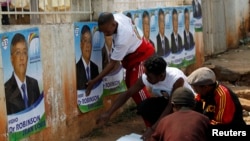JOHANNESBURG —
As Madagascar prepares for crucial presidential polls on Friday, UNICEF is hoping the vote will bring much-needed stability after five years of political crisis left the island’s 22 million people in dire need. With an estimated 92 percent of the population living on just $2 a day, UNICEF says there is not more time to waste.
Madagascar has moved from one problem to another since 2009, when Andry Rajoelina, the mayor of the capital, Antananarivo, ousted President Marc Ravalomanana in a coup backed by the army. The political upheaval dominated the government and little to no attention was paid to the needs of the people.
Steven Lauwerier, UNICEF Representative in Madagascar, said the presidential vote on Friday is a golden opportunity to get the country back on track.
The coup resulted in the suspension of the international aid, which accounts for 40 percent of the national budget. And that, said Lauwerier, has in turn led to severe cuts in government social programs.
“The burden of the crisis came back to families. Families had to pay for the children to go to school. Families had to pay far more for the health services. One-point-five million children that are not at school at this moment - that’s a lost generation. Those are sacrifices that had to be made at the cost of the most vulnerable, unfortunately in the society,” said Lauwerier.
Misery in numbers
Statistics from UNICEF tell more of the story. Five Malagasy women die each day in childbirth and five children under the age of five are reportedly dying every hour, due to diseases that are preventable.
Worse still, one in two children are malnourished while 80 percent of them live below the poverty level.
Lauwerier said Madagascar's people are pinning their hopes on Friday’s election to bring improvements.
“Everybody hopes it will bring change, but that will depend, of course, on the politicians themselves, and it will depend on those who win and those who lose to accept that they lost. But everybody hopes that that will stick back the kind of confidence from the international community as well in the country and confidence that also investors need to invest in the country and bring a bit of stability,” said Lauwerier.
Thirty-three candidates are contesting the presidency. If no candidate gets 50 percent of the vote in the first round, the two top contenders will compete in a second round scheduled for December 20, when parliamentary elections also take place.
Madagascar has moved from one problem to another since 2009, when Andry Rajoelina, the mayor of the capital, Antananarivo, ousted President Marc Ravalomanana in a coup backed by the army. The political upheaval dominated the government and little to no attention was paid to the needs of the people.
Steven Lauwerier, UNICEF Representative in Madagascar, said the presidential vote on Friday is a golden opportunity to get the country back on track.
The coup resulted in the suspension of the international aid, which accounts for 40 percent of the national budget. And that, said Lauwerier, has in turn led to severe cuts in government social programs.
“The burden of the crisis came back to families. Families had to pay for the children to go to school. Families had to pay far more for the health services. One-point-five million children that are not at school at this moment - that’s a lost generation. Those are sacrifices that had to be made at the cost of the most vulnerable, unfortunately in the society,” said Lauwerier.
Misery in numbers
Statistics from UNICEF tell more of the story. Five Malagasy women die each day in childbirth and five children under the age of five are reportedly dying every hour, due to diseases that are preventable.
Worse still, one in two children are malnourished while 80 percent of them live below the poverty level.
Lauwerier said Madagascar's people are pinning their hopes on Friday’s election to bring improvements.
“Everybody hopes it will bring change, but that will depend, of course, on the politicians themselves, and it will depend on those who win and those who lose to accept that they lost. But everybody hopes that that will stick back the kind of confidence from the international community as well in the country and confidence that also investors need to invest in the country and bring a bit of stability,” said Lauwerier.
Thirty-three candidates are contesting the presidency. If no candidate gets 50 percent of the vote in the first round, the two top contenders will compete in a second round scheduled for December 20, when parliamentary elections also take place.




